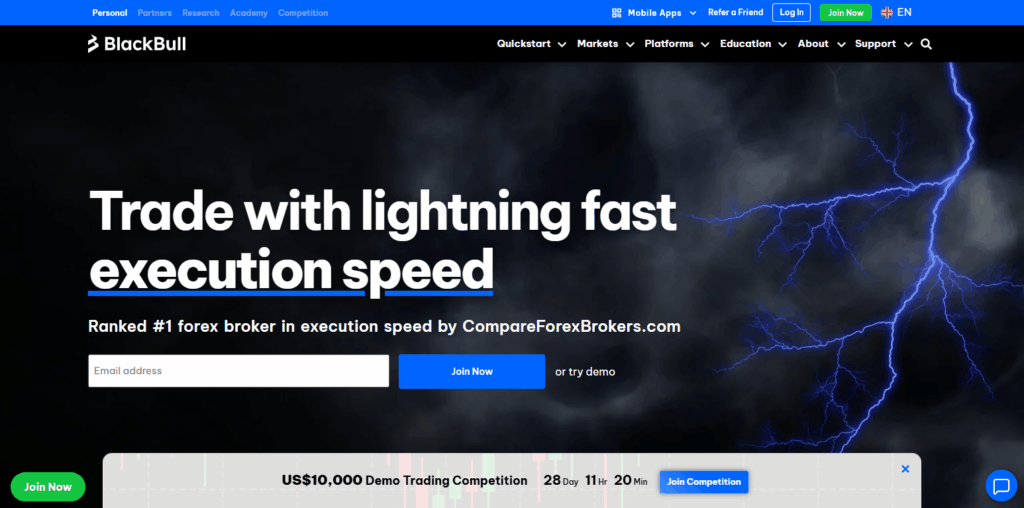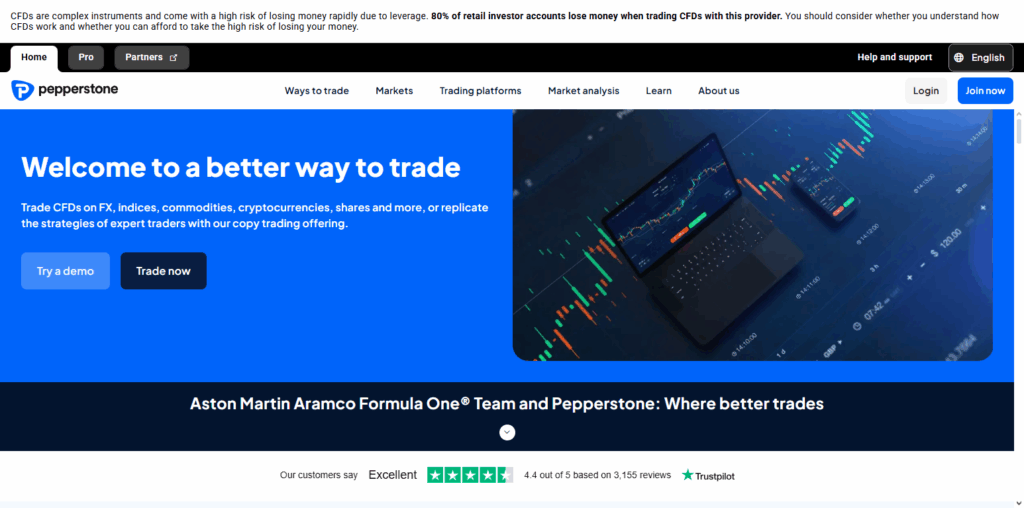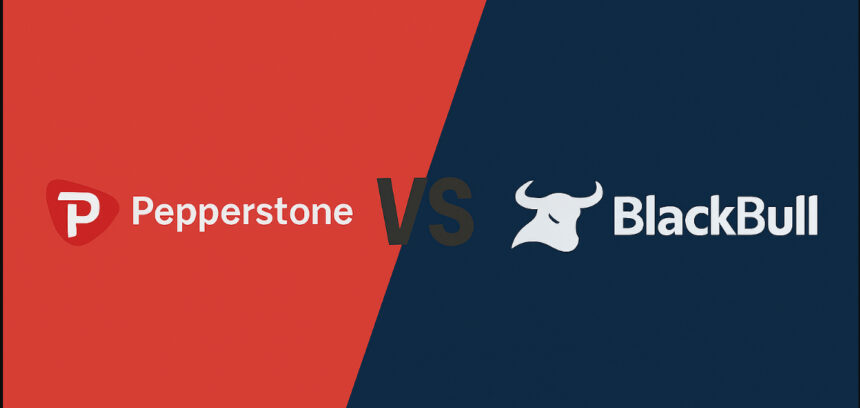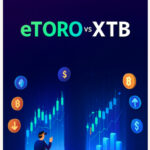Deciding whether Pepperstone or BlackBull Markets is better can be tricky as each is known for competitive spreads, swift order execution, and widely used platforms like MetaTrader.
Pepperstone is clearly better for beginners thanks to strong global regulation and beginner-friendly offerings, while BlackBull Markets targets experienced traders with more tradable instruments and higher leverage.
For this comparison, we focus on their fees, trading conditions, overall features, and performance to find which of the two is best for you.
What Is BlackBull Markets?
BlackBull Markets is a Forex broker which is considered a FinTech industry and based in New Zealand. The broker provides clients with ECN/NDD execution assurance with ample liquidity via the MT4/MT5 and TradingView platforms, and the Autochartist plugin.

Trading signals are offered for a monthly subscription, but educational materials are provided at no cost. Also, social trading is available using market leaders ZuluTrade and Myfxbook Autotrade, and the new HokoCloud, as well as proprietary social trading systems.
What Is Pepperstone?

Pepperstone enhances its MT4/MT5 platforms with its proprietary Smart Trader Tools suite, which also integrates with CTrader. As of recently, clients can automate trading using the new Capitalise AI tool. Myfxbook Autotrade, DupliTrade, and embedded solutions for social trading on all three platforms are also available.
BlackBull Markets vs Pepperstone — Comparison Table
| Feature | BlackBull Markets | Pepperstone |
|---|---|---|
| Headquarters | New Zealand | Australia |
| Regulators | FMA, FSA | ASIC, BaFin, CMA, CySEC, DFSA, FCA, SCB |
| Tier 1 Regulator(s)? | ❌ | ✅ |
| Owned by Public Company? | ❌ | ❌ |
| Year Established | 2014 | 2010 |
| Execution Type(s) | ECN/STP, No Dealing Desk | No Dealing Desk (NDD) |
| Minimum Deposit | $0 | $0 |
| Negative Balance Protection | N/A | ✅ Yes |
| Trading Platform(s) | MetaTrader 4, MetaTrader 5, cTrader, TradingView | MT4, MT5, cTrader, Proprietary Platform, TradingView+ |
| Average Trading Cost (EUR/USD) | 1.1 pips | 1.1 pips |
| Average Trading Cost (GBP/USD) | 1.55 pips | 1.4 pips |
| Average Trading Cost (WTI Crude Oil) | $0.03 | $2.50 |
| Average Trading Cost (Gold) | 0.12 pips | $0.15 |
| Retail Loss Rate | Undisclosed | 74–89% |
| Minimum Raw Spreads | 0.0 pips | 0.0 pips |
| Minimum Standard Spreads | 0.8 pips | 1.0 pips |
| Minimum Commission for Forex | $4.00 per round lot | $6.00 (cTrader) / $7.00 (MT4/MT5) per round lot |
| Islamic Account | ✅ | ✅ |
| Signals | ❌ | ✅ |
| US Persons Accepted? | ❌ | ❌ |
| Managed Accounts | ✅ | ❌ |
| Visit Website | ✔️ Visit Website | ✔️ Visit Website |
Which is Better for Trading Instruments, BlackBull Markets or Pepperstone?
At BlackBull Markets, clients have access to trade Forex, Gold & Silver, Stocks, Crypto, CFDs, and even more Cryptos, and ample trading and investment options including Gold, Silver and Oil CFDs, and Commodities CFDs are available as well.
BlackBull is geared towards clients with focus on stock market as they are offered thousands of equity instruments to trade along with Forex and CFDs.
At Pepperstone, apart from Forex, Gold & Silver, Crypto, Stocks and CFDs, they have globally diversified and traded Indices, Oil, Agri and Soft Commodities, Energies, and other CFDs available including own and managed ETFs which gives ability to trade large diversified instrument pools, and is ideal for clients looking for passive approaches.
Pepperstone vs BlackBull Markets: Features Comparison
Pepperstone — Key Features
- Provides 1,250+ trading instruments such as Forex, CFDs, and stocks, as well as commodities and cryptocurrencies.
- Leverage of 1:500 for pro traders (1:30 for regulated retail clients under ASIC, FCA, BaFin & CySEC).
- No minimum deposit (Suggested: ~$200 for margin).
- Two account types: Standard (spread-only) & Razor (commission-based).
- Trading costs are reasonable with spreads 1pip or $3–3.5 commission per lot.
- Provides PAMM/MAM investment solutions.
- Scalping, news trading, and EA/robot trading allowed.
- Highly regulated and a respected reputation across multiple top-tier jurisdictions.
BlackBull Markets — Key Features
- Massive market access with 26,000+ instruments such as Forex, equities, indices, and cryptocurrencies, as well as metals, energies, and futures.
- High leverage of 1:500.
- Minimum deposit $0 making it reachable for every trader.
- Three account types: ECN Standard, ECN Prime & ECN Institutional.
- 0.0 pip spreads on higher-tier accounts (Commission starts from $6.00 per lot depending on account type).
- PAMM/MAM investment systems are completely supported for money managers.
- Scalping, news trading & automated trading allowed.
- Centered on rapid ECN execution and extensive liquidity
Pepperstone vs BlackBull Markets: Trading Conditions
| Trading Conditions | Pepperstone | BlackBull Markets |
|---|---|---|
| Minimum Deposit | $0 (Recommended ~$200 for margin) | $200 |
| Trading Platforms | MT4, Mobile Trading, WebTrader, cTrader, TradingView | MT4, MT5, WebTrader, Mobile Platforms |
| Max Leverage (Futures) | 1:500 | 1:500 |
| Supported Markets | Forex, CFDs on Stocks, Commodities, Metals, ETFs, Shares, Crypto | Forex, Index CFDs, Commodities, Precious Metals, Energy |
| Trading Assets | 1,200+ | 24,000+ |
| Trading Accounts | Razor, Standard | ECN Standard, ECN Prime, ECN Institutional |
| Base Account Currencies | AUD, USD, JPY, GBP, EUR, CAD, CHF, NZD, SGD, HKD | USD |
Pepperstone vs BlackBull Markets: Fees Comparison
| Fees | Pepperstone | BlackBull Markets |
|---|---|---|
| Standard Acc. Spread EUR/USD (Min Pips) | 0.5 | 0.2 |
| Standard Acc. Spread EUR/USD (Max Pips) | 1.5 | 0.8 |
| ECN Commission (per side, USD) | $3 | $3 |
| ECN Spread EUR/USD (Pips) | 0.1 | 0.3 |
| Deposit Fee | No | No |
| Withdrawal Fee | No | Yes ($5) |
| Inactivity Fee | No | No |
Security & Trust
| Security Factor | BlackBull Markets | Pepperstone |
|---|---|---|
| Founded | 2014 | 2010 |
| Headquarters | New Zealand | Australia |
| Regulators | FMA, FSA | ASIC, BaFin, CMA, CySEC, DFSA, FCA, SCB |
| Tier-1 Regulators | ✅ FMA | ✅ ASIC & FCA |
| Negative Balance Protection | ✅ | ✅ |
| Segregated Funds | ✅ | ✅ |
| US Clients Accepted | ❌ | ❌ |
| Retail Loss Rate | Undisclosed | 74–89% lose money |
Pepperstone vs BlackBull Markets Pros & Cons
✅ Pepperstone — Pros
- Offers a large range of tradeable instruments, including Forex, commodities, indices, ETFs and crypto, accessible to both beginners and professionals.
- Multiple platform support: MT4, MT5, cTrader, TradingView and proprietary solutions enable flexibility.
- Competitive pricing: Tight spreads, low commissions and no non-trading fees in many cases.
- Strong regulatory oversight in several jurisdictions, improving trust and safety for regulated clients.
- Supports advanced trading styles including scalping, automated trading (EAs/robots) and copy/social trading.
❌ Pepperstone — Cons
- Some commissions and fees (e.g., for Razor accounts) may be higher compared to very low-cost competitors.
- Certain service limitations: for example, some cryptocurrency payment or account funding options may be limited.
- Not available for clients in some jurisdictions (e.g., U.S., Canada) which may limit access.
✅ BlackBull Markets — Pros
- Huge market coverage: With over 26,000+ tradable instruments including equities, futures, commodities and more, it offers significant diversification.
- Very competitive trading conditions for active traders: raw spreads from 0.0 pips on high-tier accounts and deep liquidity via ECN model.
- Low entry barrier for standard account: Minimum deposit of $0 in many cases makes it accessible.
- Fully supports scalping, news trading, automated trading (EAs) and multiple platforms — good for advanced strategies.
❌ BlackBull Markets — Cons
- Although Tier 1 regulated in New Zealand (Financial Markets Authority, FMA) many clients trade under entities regulated in lower tier jurisdictions which for some reduces protection.
- Withdrawal fees (example: $5 charge) and some traders may find this less favourable compared to no withdrawal cost brokers.
- While the instrument range is huge, some asset classes (for example some crypto payment methods, localised funding) may be less well-supported compared to niche brokers.
Conclusion
Pepperstone and BlackBull Markets have their strengths and weaknesses within the scope of the online trading competitors, as they have slightly differentiated targets within the trading community.
For global traders, and especially for those concerned with regulatory supervision and stable pricing, the ‘better’ option is the one that has outstanding supervision and rapid execution as well as diverse trading platforms; these attributes make Pepperstone more reliable and secure.
As for BlackBull Markets, from the perspective of more advanced traders, dealers, and diversified traders with larger trading volumes, the appeal is slightly different; competitive ECN pricing together with a broader range of trading tools clearly offers better value.
FAQ
Which broker is better for beginners?
Pepperstone is generally more beginner-friendly thanks to its strong regulation, reliable customer support, and stable trading conditions. BlackBull Markets is better suited for traders with some experience who want more asset options.
Who offers more trading instruments?
BlackBull Markets provides access to 26,000+ instruments, including equities and futures, which is significantly higher than Pepperstone’s 1,250+ instruments.
Which broker has better spreads?
Both offer competitive spreads, but BlackBull Markets’ ECN accounts often provide slightly lower minimum spreads, especially for high-volume traders.
Is Pepperstone or BlackBull Markets more regulated?
Pepperstone is more strictly regulated by multiple top-tier regulators like ASIC, FCA, CySEC, BaFin, giving clients stronger protection. BlackBull Markets is regulated primarily by the FMA (New Zealand) and FSA (Seychelles).
Which broker offers higher leverage?
BlackBull Markets offers leverage up to 1:500 for most traders. Pepperstone provides 1:30 for retail clients in highly regulated regions, and up to 1:500 only for eligible professional or offshore clients.









